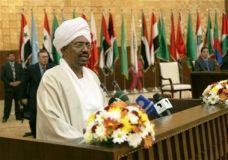Arab leaders conclude Khartoum summit
Mar 29, 2006 (KHARTOUM) — Arab leaders concluded an annual summit Wednesday with their usual pledges of solidarity with Palestinians and Iraqis.

The two-day summit, devalued by the absence of several key leaders, also backed host Sudan in its opposition to the deployment of U.N.-led peacekeepers in its troubled western Darfur region.
In a sign of apathy about the meetings, Saudi Arabia, next year’s chair country, declined to host the 2007 summit, saying it preferred that it be held in Egypt, home to the headquarters of the Arab League.
The annual meetings of the Arab League regularly tackle challenging regional issues but are often criticized for concluding with resolutions that are long on rhetoric but short on specific action.
Iraqi Foreign Minister Hoshyar Zebari, reflecting the notion of the summits’ relative uselessness, demanded firm Arab commitments to his country, wracked by a brutal insurgency and a growing sectarian rift.
Addressing the summit’s final session, he said: “It is our right to tell our brothers, after decades of the authoritarian rule and wars, that we expect them to support our political march and extend any help and backing that will contribute to isolating terrorism and drying up of the sources that finance its activities.”
“It is our right to ask you to upgrade your diplomatic representation to the ambassadorial level and be generous by visiting Baghdad, your historic capital and the cradle of Islamic and Arab civilization…The Iraqis wish to see their brothers among them,” said Zebari, who also asked Arab countries to forgive Iraq’s debts.
A summit resolution on Iraq said Arab leaders agreed to send diplomats to Baghdad, though it did not give a timeframe. Arab nations have been hesitant to send high-level diplomats to Baghdad since the kidnapping and murder of Algerian and Egyptian diplomats there last year.
The Khartoum Declaration, a summary of the agreements reached in this week’s summit, also saluted January’s Palestinian parliamentary elections, which produced a landslide victory by the militant Hamas, and called on the international community to respect the result of that vote.
The leaders renewed their commitment to a 2002 Arab peace initiative, which offered Israel a comprehensive peace in return for a withdrawal from Arab lands. Israel has rejected that initiative.
In a coup for Sudanese President Omar al-Bashir, the leaders pledged financial backing for the African Union peacekeeping mission in Sudan’s Darfur region and rejected the imposition of a U.N.-led force without Khartoum’s permission.
Al-Bashir has resisted Western pressure to let the U.N. take over from the 7,000 AU troops there, saying that would violate Sudan’s sovereignty.
The leaders also addressed the caricatures of Islam’s Prophet Muhammad that were published in European newspapers, causing widespread outrage among Muslims and some violent protests.
The declaration urged the need for “cooperation, dialogue and mutual respect between peoples and cultures…and remind that respecting religious sanctities and beliefs is the decisive factor in building confidence and bridges of friendship between nations.”
An internal Lebanese conflict also made its way to Khartoum, where Prime Minister Fuad Saniora arrived with his own mini-delegation to counter what he called the “lack of Lebanese representation” shown by the official delegation led by President Emile Lahoud.
Saniora heads an anti-Syrian majority government that is demanding the resignation of Lahoud, who is strongly pro-Syrian.
The leaders did not take sides in the conflict, focusing their declaration instead on supporting Lebanon’s Hezbollah militant group – a Syrian and Iranian-backed body that the West wants disarmed – and supporting Syria in the face of international pressure and U.S. sanctions.
The summit also unanimously extended Egyptian Amr Moussa’s term as Arab League secretary-general for another five years.
(ST/Ap)
